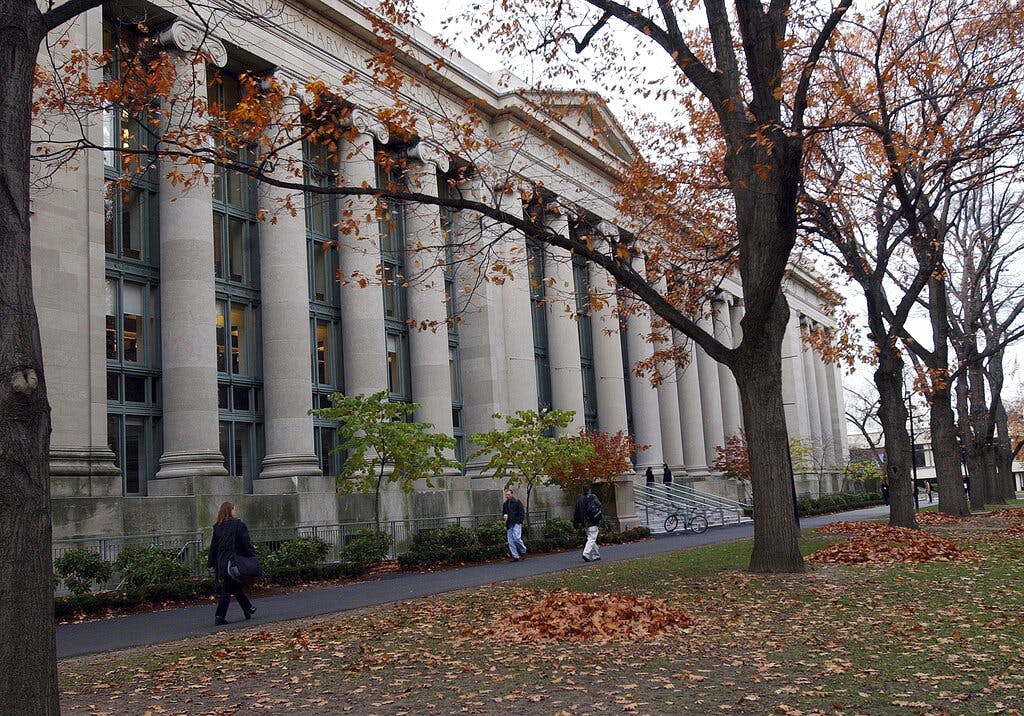Barbarians at Harvard’s Gate: Dissident Candidates for Board of Overseers Seek To Replace ‘Politics’ With ‘Academic Freedom’
Yet one candidate says that Harvard has ‘locked up the process’ of joining its Board of Overseers.

“Disenfranchising” is how one candidate for Harvard’s Board of Overseers describes the process of joining the university’s elusive governance structure, which a slate of alumni are petitioning to join this month.
These barbarians at Harvard’s gate are nonetheless digging in their heels in a bid to restore free speech and academic excellence at the nation’s oldest university. A group of four alumni called “Renew Harvard,” along with a co-founder of the Foundation for Individual Rights and Expression, Harvey Silverglate, and a successful venture capitalist, Sam Lessin, hope to fill the five seats on Harvard’s 30-person Board of Overseers that are up for grabs this spring.
The university’s governance, including the overseers and the smaller, much more powerful Harvard Corporation, has faced a public relations failure in recent months. Scrutiny surrounds leaders’ failure to tame the pro-Palestinian protests disrupting campus life since Ocotber 7, their repeated support for President Claudine Gay until her resignation early this month, and the centrality of diversity, equity, and inclusion in their decision-making.
The alumni petitioners seek to put Harvard on a better path. “A lot of the leadership of Harvard individually agrees that Harvard needs to get out of the politics game, especially in the light of the Supreme Court decision,” Mr. Lessin tells the Sun, “and refocus itself academically, protect its students, and have transparent rules that are equally applied. I’m hoping to see a lot of change there.”
Mr. Lessin seeks to revive the Board of Overseers’ original mission, which is to serve as “a serious check and balance with the Corporation to make sure the right people and the right policies are happening,” he says. It has little formal power and is seen as “a consultative board,” Mr. Lessin says, though its members vote on the elections of the school’s president and members of the Corporation.
Bureaucratic bloat is a concern of Mr. Silverglate. Harvard has roughly 2,600 more administrators than undergraduates, a more than 9 percent increase from 10 years ago. For every faculty member there are three administrators. “When you have that many administrators with nothing useful to do,” he says, “they advise speech codes, they enforce them, they prosecute and persecute students for the most minor offenses.”
Mr. Silverglate, who calls himself a “general troublemaker,” tells the Sun he is campaigning on a “free speech and academic freedom platform.” The administration’s failure to stop student protestors from occupying Widener Library undercuts its credibility and its mission, Mr. Lessin adds. “Harvard is private property,” he says. “Students should be able to protest — they can go to Boston Common.”
The Renew group also seeks to protect free inquiry, as well as “restore leadership excellence to Harvard” and “remedy operational and endowment mismanagement.” A billionaire hedge fund manager and prominent critic of Ms. Gay, Bill Ackman, has endorsed the four dissident students — Zoe Bedell, Logan Leslie, Julia Pollak, and Alec Williams. A celebrity Harvard professor, Steven Pinker, has backed Ms. Pollak, Mr. Silverglate, and Mr. Lessin.
Despite such support, campaigning to join a 400-year-old governance structure is no easy task. The school’s two governing bodies are designed to keep the old guard in and outsiders out — including some of its alumni. “They’ve locked up the process,” Mr. Lessin says. “They’re making it really difficult for alums to put themselves forward that are outside of the establishment.”
Every year, the body tasked with representing alumni, the Harvard Alumni Association, announces a new slate of candidates for the board, who tend to have senior roles within HAA. Any Harvard degree-holder without an official endorsement can gather petition signatures to join the ballot, yet the ballots only allow for two petition candidates, regardless of how many qualify.
Harvard heightened these restrictions after an alumni group called the Harvard Forward installed two people on the board in 2020 after running a campaign “to see Harvard become an indisputable leader in combating the climate crisis.” Petitioners previously needed to collect 500 votes to get on the ballot, but now need about 3,300 votes. That constitutes, by Mr. Lessin’s estimate, 10 percent of the alumni voting population of 30,000.
Alumni must also register to vote through Harvard’s online portal, the HarvardKey, which is complicated to use and accessed by only a fraction of Harvard’s more than 400,000 greater community. Mr. Lessin calls the process “disenfranchising.”
The winds of institutional change, though, appear to be swinging in the candidates’ favor. “I think I might have an energized electorate because Claudine Gay’s conduct in the last couple of weeks has been such that it has radicalized a lot of people,” Mr. Silverglate tells the Sun. As part of his campaign, he suggests “that every member of the Harvard Corporation who voted for her should resign.”
While the school is a private institution and can govern as it sees fit, it relies heavily on its tax-exempt status to get donations from outside stakeholders, including alumni, who are demanding a say in the university’s governance. More importantly, perhaps, it also relies heavily on federal grant money as a key source of revenue, which gives the federal government influence in its affairs. Congress is currently flexing that muscle. Congresswoman Virginia Foxx, chairwoman of the Committee on Education and the Workforce, is conducting a probe of Harvard.
The Corporation, chartered in 1650, is “run with almost no transparency and in a way that makes it really hard to sometimes trust or understand their decisions,” Mr. Lessin says. “They need to readdress and think about how they communicate more broadly and better about the decisions they’re making.”
“As an overseer, I would’ve asked the questions about Gay’s academic record,” he says. “With Gay out, the overseers will play a critical role in terms of selecting the next president.”

